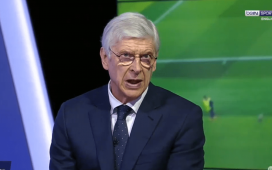The Saudi-funded takeover of Newcastle United football club has been cast into doubt as a result of the country’s alleged involvement in the illegal streaming of sports fixtures.
A draft report from the World Trade Organization (WTO) reportedly concludes that the oil-rich kingdom is behind beoutQ, a pirate satellite TV and streaming service that is in breach of international law.
What is the beoutQ dispute about?
The world’s leading football authorities including the Premier League have been trying for years – unsuccessfully – to block beoutQ in Saudi Arabia.
In 2018, after nine local legal firms declined to take on the copyright case, a case against the kingdom was taken to the WTO, “the highest judicial body that could rule on the matter”, which has now issued its ruling, reports The Guardian.
Although “the WTO’s 130-page final report will not be published until mid-June, it is understood that the independent ruling firmly establishes that the Saudi government is behind beoutQ”, says the newspaper.
The verdict is likely to threaten the £300m Newcastle United takeover by Saudi Arabia’s Public Investment Fund, which was purchasing an 80% stake in the English club.
Doubts have been raised as to whether the prospective owners can pass the Premier League’s owners and directors test, which can be failed if a crime is committed overseas that would also be illegal under UK law.
The chief executive of beIN Media Group, which holds rights to the Premier League in the Middle East and North Africa regions, recently wrote to Premier League chiefs urging them to block the controversial takeover.
Yousef al-Obaidly’s letter revealed Saudi Arabia’s alleged “theft of clubs’ intellectual property and commercial rights for nearly three years”, reports SportsBusiness.
The British government has also taken the issue of Saudi piracy seriously, according to The Guardian.
Liam Fox, the then secretary of state at the Department for International Trade, contacted a colleague last July to say that he had “written to Dr Majed Al Qasabi, the minister for commerce and investment in the kingdom of Saudi Arabia and [that] the Chancellor of the Exchequer has recently raised beoutQ with ministers in Saudi Arabia”.
The Saudi authorities have repeatedly denied being involved with beoutQ.
Why is Newcastle being sold?
Newcastle United is currently owned by Sports Direct billionaire tycoon Mike Ashley, who has had a strained relationship with the club’s fans.
Despite initial optimism when Ashley bought the club 13 years ago, his years at the helm have marked “one of the most disastrous ownerships in English football”, says FourFourTwo.
He first indicated that he was willing to sell the club back in 2008, but has held on since through a string of failed deals, the football news site adds. With the Saudi takeover plan, Ashley appeared to be on the verge of finally ending his toxic relationship with Newcastle United – but may now see that hope kicked into touch too.
What other concerns have raised about the takeover?
Saudi Arabia’s alleged involvement in the illegal streaming platform is just the latest in a series of objections to the proposed deal.
Amnesty International wrote to Premier League chief executive Richard Masters last month urging him to take into consideration the human rights situation in Saudi Arabia as part of his organisation’s owners and directors test.
The rights group’s UK director, Kate Allen, warned that the Premier League risked becoming “a patsy” and a vehicle to distract from the kingdom’s abuses, reports The Independent.
“So long as these questions (concerning Saudi Arabia’s human rights record) remain unaddressed, the Premier League is putting itself at risk of becoming a patsy of those who want to use the glamour and prestige of Premier League football to cover up actions that are deeply immoral,” Allen wrote.
The Independent’s chief football writer Miguel Delaney also argues that the takeover is an attempt at “sportswashing”, adding that it is simply a “more sophisticated” version of PR that is “nakedly political”.
Amnesty lists the ways in which Saudi Arabia violates human rights on its website, with practices including: torture, executions, bans on free speech and protests, discrimination against women, religious discrimination, and the barring of human rights organisations.
The country has also been widely criticised over the 2018 killing of journalist Jamal Khashoggi, an outspoken critic of the Saudi regime and of Crown Prince Mohammad bin Salman.
Khashoggi was murdered after going to the Saudi consulate in Istanbul to obtain papers that he needed to marry his fiancee.
The Saudi authorities said the killing was the result of a “rogue operation” by a team of agents sent to persuade him to return to the kingdom, but most of the international community believes that the order came from the crown prince.














